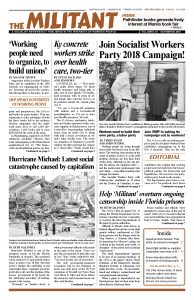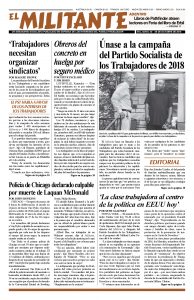The Militant filed an appeal Oct. 15 asking the Florida Department of Corrections Literature Review Committee to overturn the latest impoundment of the paper by prison authorities.
Officials at Florida State Prison in Raiford alleged that articles on the fight against solitary confinement in California prisons and the hunger strike by Oleg Sentsov, a Crimean film director imprisoned in Moscow’s gulag, are “a threat to the security, good order, or discipline” of the prison and encourage “insurrection.”
This latest impoundment “appears to be part of an ongoing targeting” of the Militant, the paper’s lawyer David Goldstein, of the Rabinowitz, Boudin, Standard, Krinsky & Lieberman civil rights law firm, wrote, “for unconstitutional and arbitrary content-based and viewpoint-based censorship.”
When a paper is impounded at one Florida prison, they’re taken away from subscribers in all prisons there.
Prison wardens and officials “have attempted to censor nine of the past 16 issues” of the Militant, he said. In the last year and a half they have impounded at least 19 issues, roughly “four times as many as in the entire rest of the nation, state and federal prisons combined, in the past decade.”
This forces the Militant “to expend substantial resources battling these ongoing unconstitutional and improper efforts to ban” the paper, Goldstein wrote, adding that the Literature Review Committee should tell wardens to adhere to their own rules and to the Bill of Rights.
The Militant has published similar articles on solitary confinement and on Sentsov’s freedom fight in previous issues, which were not impounded, Goldstein noted. Nothing in these articles encourages violence, prison disruption or any other prohibited activity, he said.
Speak out against censorship
The New York City Militant Labor Forum hosted a panel discussion Oct. 13 titled, “Join the Fight Against Prison Censorship: Defend the Right of Workers Behind Bars.” The program took up the censorship of the Militant in Florida prisons and a new policy by state officials in Pennsylvania that restrict prisoners’ access to books, periodicals and letters.
James Tager, deputy director of Free Expression Policy and Research from PEN America, was the first speaker. PEN America, founded in 1922, brings together novelists, journalists, editors, poets and others to defend against attacks on writers and defend people’s rights to read whatever they choose.
“We’ve also noted a pronounced uptick in attempts to restrict prisoners’ access to books and newspapers,” Tager said. He pointed to a “pilot project” in New York state earlier this year that limited prisoners to ordering books from just a handful of vendors. The limited selection had only a few dozen titles, heavy on coloring books and religious texts.
“They were forced to back off on the restrictions because there was a public outcry,” he said.
Justin Mazzola, a deputy director of research at Amnesty International USA, pointed out that “like PEN America, we’ve written many letters opposing the censorship of the Militantand of Prison Legal News,”another publication that has fought ongoing attempts by prison officials to keep it out of the hands of inmates.
The government claims that prison is supposed to “rehabilitate” prisoners, Mazzola said, but by denying them the right to the literature of their choosing, they make it harder for people behind bars to be part of the world and prepare for their life outside prison walls.
Willie Cotton, speaking for the Socialist Workers Party, outlined the Militant’s fight against censorship in Florida prisons. “Sometimes they’ve censored articles for writing about the fight against censorship,” Cotton said.
Prisons and the criminal “justice” system aren’t set up to dispense justice, Cotton noted, but to keep working people in their place. They run you through the plea bargain system, where over 90 percent of people who face charges are forced to cop a plea, regardless of whether they did anything or not.
As the class struggle outside prison walls heats up, we will see more attempts to take away constitutional rights of those behind prison bars, Cotton said.
“In fighting for the Militant, we’re not fighting only for our newspaper or even for subscribers,” Militant editor John Studer said in the discussion, “but for all workers behind bars to read the literature of their choosing, to think for themselves and to be part of the movement to change the world.”
Everyone opposed to the Florida prison system’s violations of the Bill of Rights can help out with this fight by writing a letter, and getting unions, church groups, community organizations, co-workers and others to do likewise, opposing censorship of the Militant.
Send letters to Dean Peterson, Library Services Administrator, Florida Department of Corrections, Attn: Literature Review Committee, 501 South Calhoun Street, Tallahassee, FL 32399-2500, and via email to Allen.Peterson@fdc.myflorida.com. Please send a copy and a contribution to continue this battle to the Militant.

